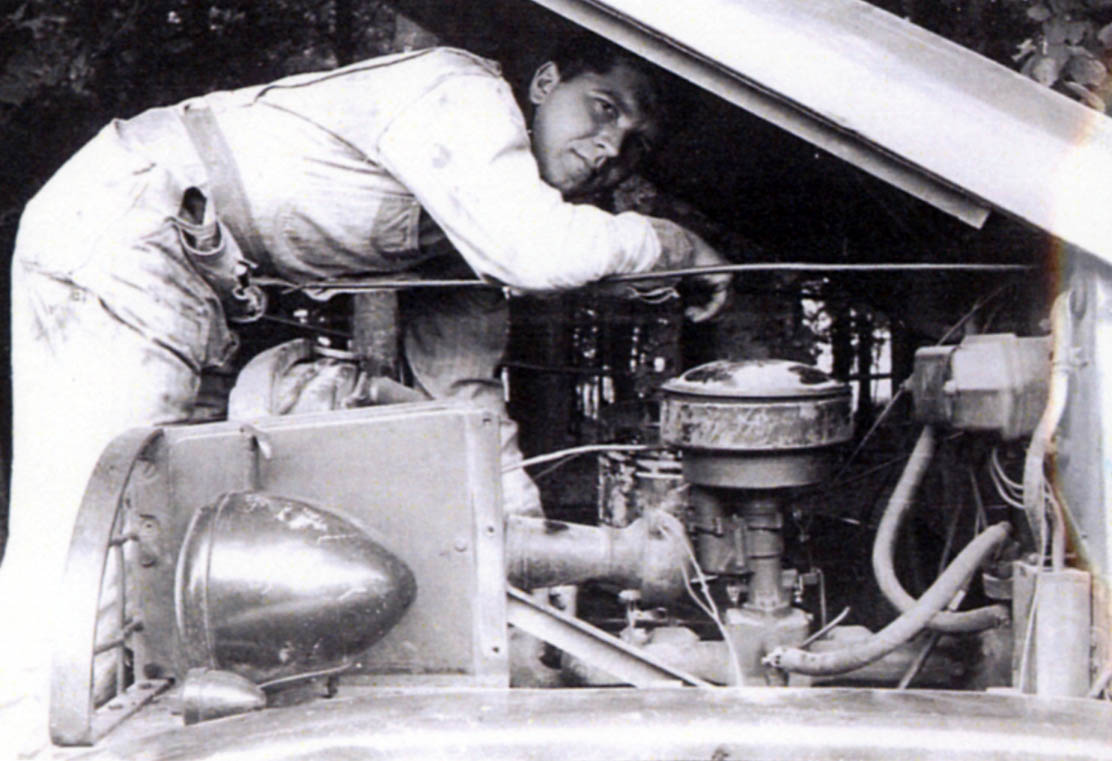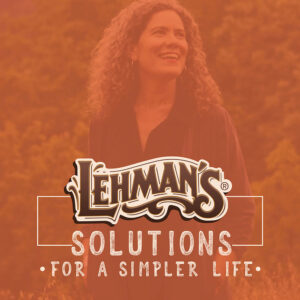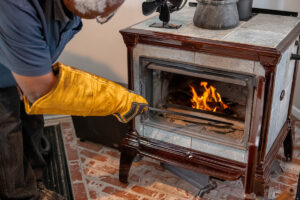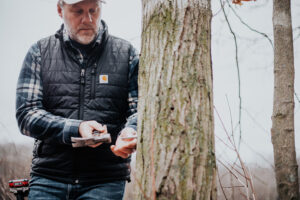
Jay “Junior” Lehman, a 21-year-old farm boy from Ohio, sailed to Europe in 1951 as part of the first wave of conscientious objectors to military service in a new program called Pax. Their freighter docked at Antwerp, Belgium, on April 6. Waiting for them on the dock was the program’s first director, Cal Redekop.
Redekop escorted the group of 20 draft-age men to Germany, where their first job was to turn Nazi poison-gas bunkers in Espelkamp into housing for World War II refugees. The Pax “boys,” as they were called, had no power tools or mechanized machinery. “It was all back-breaking labor,” said Redekop.
Pax, a program of Mennonite Central Committee, was created in response to the reinstatement of the military draft in the United States after the start of the Korean War. Mennonites, Quakers, Brethren, and others who were conscientiously opposed to war could perform alternative service. Pax continued until 1975, three years after the U.S. draft ended.
On April 26, 2015, Lehman, now 86, traveled from Ohio to reunite with Redekop and others at James Madison University in Harrisonburg, Virginia, where the Pax program was to receive an award from JMU’s Gandhi Center for Global Nonviolence.
Nearly 300 people, including 60 Pax veterans, packed a reception hall at JMU to celebrate the legacy of Pax. Terry Beitzel, new director of the Gandhi Center, noted that this was only the fourth such award in the center’s 10-year history. Previous awardees included former President Jimmy Carter and South African anti-apartheid leader Desmond Tutu.
Beitzel, who also teaches in JMU’s Justice Studies Department, first came to Harrisonburg to take classes in the Center for Justice and Peacebuilding at Eastern Mennonite University. He heard about EMU from his graduate studies advisor at Harvard University.
“Pax was chosen for the award because of its contribution to establishing alternative service programs, including the U.S. Peace Corps,” said Beitzel, “but primarily because of the emphasis on service to others.”
Redekop, now 89 and living in Harrisonburg, represented Pax in accepting the award from JMU Provost Jerry Benson, who said “Pax serves as an example of service and peacemaking for all of us today.” He also noted that Redekop was the co-founder of Pax, along with the late Paul Peachey.
“I’m only the handmaiden for Pax or handlanger – German for middleman – so I’m going to hand over this plaque to someone higher up in MCC,” joked Redekop. He called up Ann Graber Hershberger, who chairs the MCC U.S. board.
Hershberger, who is a nursing professor at EMU, said she grew up hearing about Pax and later served with MCC in Central America with her husband for 10 years.
Redekop grew up in the Midwestern dust bowl of the Great Depression. He was part of the immigrant community of German-speaking Mennonites from Russia, which came in handy later when was able to speak the low-German dialect of the Mennonite refugees coming out of the Soviet Union.
He went to Europe with MCC in 1950 to help with post-war relief. “Mostly we delivered food and blankets to refugees,” he said. When the U.S. draft was re-started, he and MCC staff in Europe designed the alternative service program that they named Pax.
Redekop spent most of his career after Pax as a college sociology professor. His most recent school was Conrad Grebel College in Kitchener-Waterloo, Ontario.
Lowell Bender, a Pax worker in Germany and Austria, 1961-63, emceed the Gandhi Center event. “We were all changed by our experiences,” he said. Bender enrolled at EMU after his Pax service, graduating in 1967. He is now retired from 35 years as a professor and administrator at Garrett Community College in Maryland. He serves on the MCC U.S. board.
Ervie Glick, a retired German-language professor at EMU, said many of the Pax veterans still stay in touch with the people they served.
Paul Harnish of Doylestown, Pennsylvania, visited a large, modern chicken processing co-op a few years ago that he helped start in an impoverished area of Greece. His little hatchery began with 500 chicks that he imported from the U.S. He had to spend a night in a hotel with the chicks before he got back to his village.
Inspired by the Latin word for peace, the Pax program started in Europe with housing projects for war refugees, including German-speaking Mennonites from Ukraine, who were caught between the German and Soviet armies. At one point, Gen. Lewis Hershey, director of the U.S. Selective Service System, visited a Pax unit in Germany to help determine if the program qualified as alternative service to the military.
Later Pax branched out to development work in Africa and South America. By the time the program closed, nearly 1,200 young Americans (and some Canadians) had served in 40 countries.
Pax is featured in a book and a documentary – The Pax Story: Service in the Name of Christ, a 2001 book by Cal Redekop, and Pax Service: An Alternative to War, a 2008 documentary by Burton Buller that appeared on the Hallmark TV channel.
































